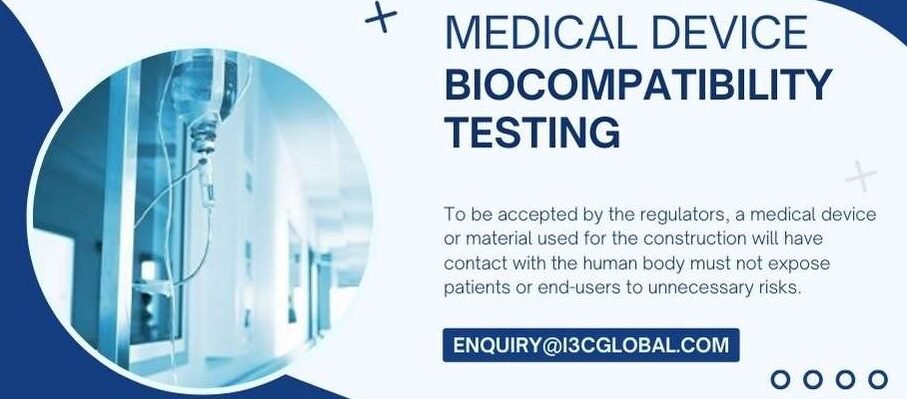Quick Contact

Biocompatibility Testing For Medical Devices
Biocompatibility Testing for medical devices is very important because systemic toxicity impairs an entire biological system, such as the nervous or immune system. The presence of extractable chemical compounds and agents from processing may also affect biocompatibility. In vitro and in vivo testing is conducted on various biomaterials, medical devices, and related products to identify the presence of toxins or any other potentially harmful effects.
Biocompatibility Testing for medical devices is used to measure the compatibility of a product with a biological system to ensure that it is not toxic or injurious and not causing immunological rejection when used in association with living tissue or a living system. The test results are used to determine the potential toxicity resulting from contact with a material or device and also to evaluate local and systemic reactions.
Biocompatibility Testing from the initial screening of new materials to product release testing, periodic audit testing, and non-clinical or pre-market safety evaluations to meet current international standards ISO 10993-1:2020 (CEN).
We help manufacturers to demonstrate biological safety and provide Fast and economical biocompatibility testing services for medical devices across the globe. We are dedicated to providing specialized support and guidance in biological evaluation report, including thorough analysis and detailed review of associated records.
Why Biocompatibility Testing is Important For Medical Devices?
Biocompatibility Testing is important because the presence of extractable chemical compounds and agents from processing may influence biocompatibility that can affect an entire biological system such as the nervous or immune system. Cytotoxicity testing is one of the tests used for evaluating these types of harmful reactions. Material interactions may cause a medical devices to fail biocompatibility Testing.
The individual materials used to make the medical device may be biocompatible in part, but the combination of various materials may cause a toxic reaction. Hence, the complete device needs to be evaluated for biocompatibility.
Biocompatibility testing refers to the evaluation of the effects of interaction between medical device and the tissues and physiological systems of the patient treated with the devices as part of the overall safety assessment of medical devices.
Analytical chemistry, in-vitro tests, and animal models are used for this testing. Several factors influence biocompatibility like the chemical and physical nature of its component materials, types of patient tissue that will be exposed to the devices, and the duration of that exposure.
The different types of biocompatibility Testing performed are:
- Acute systemic toxicity testing
- Biodegradation testing
- Carcinogenicity testing
- Chronic toxicity testing
- Cytotoxicity testing
- Genotoxicity testing
- Hemocompatibility testing
- Implantation testing
- Intra-cutaneous irritation testing
- Reproductive/developmental testing
- Sensitization testing
- Subchronic toxicity testing
Our company is dedicated to providing specialized services in biological evaluation report, including thorough analysis and detailed review of associated records.
Medical Device In-Vitro & In-Vivo Biological Testing
In-Vitro testing is the test performed outside of a living organism whereas testing performed in a whole living organism is called in-vivo testing. Cytotoxicity is performed on mammalian cells in culture to evaluate the toxicity of materials and chemicals by exposing cultured cells to the sample directly or by preparing an extract.
In-Vivo biological testing is performed after the completion of in-vitro testing. The extent of the type of testing depends upon the device’s intended use. Various tests performed as part of in-vivo testing are skin irritation testing, sensitization testing, implantation testing, and systemic toxicity testing, sub-chronic testing, and chronic testing. The turnaround time for these tests can range from weeks to greater than several months depending on the test data needed.


